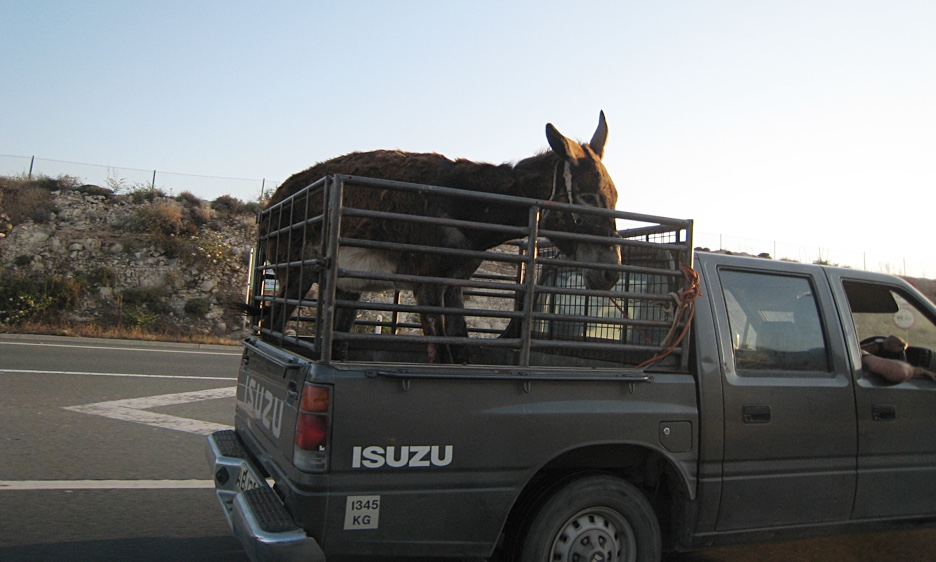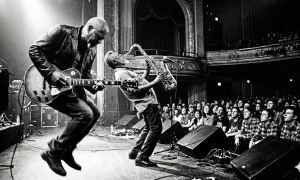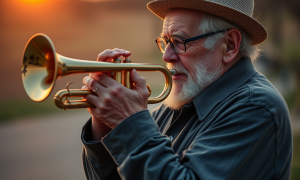Home » Jazz Articles » Jazz Fiction » Turn Out The Stars, Part 1
Turn Out The Stars, Part 1

These organ donations from baboons to humans were illegal up here, but Jolene found a doctor in Mexico to do the operation, thanks to the world wide web and the less priggish regulations of our southern neighbor. Pig hearts have been the way to go in the States since 2031— fresh, perfect organs from cloned sows with the rejection factor engineered out of them. The pig process has been painstakingly tested and approved by the FDA. But who can afford to pay for the systemic corruption and soullessness of the legally approved method? Jolene had taken a loan on the house to buy the unapproved baboon heart and the services of an Iranian doctor based in Mexico, but Frank would live if the operation went well—live poor, maybe, after all their retirement accounts had been drained, their house hocked right up to the top of its chimney. But it's better than being dead.
They rolled down in Frank's old Toyota Corolla from their home in Oceanside to Tijuana, the heart in its box in a gallon plastic food storage bag in a cooler full of regular ice sitting on the back seat, and they crossed into the chaos of Mexico's unmanaged traffic and the smell of free-flowing car exhaust and untreated sewage, then made their way to the north/south toll road, a smooth ride at first that slowed to twenty miles per hour just north of Rosarito Beach, Jolene coming up behind two side-by-side pickup trucks, one carrying a enormous pile of poorly tied- down used furniture, the other riding low on tired shock absorbers under the weight of a live burro. Frank, through his constant pain, said to Jolene that having to look at a donkey's ass on the entire trip down the peninsula might be a bad omen. She shushed him, and at the first opportunity—when the furniture truck pulled ahead—she stomped the gas and sped by the burro truck, the animal giving them a doleful look as they came alongside him. Frank made a brief eye contact with the animal as they passed, and he (of the failing human heart) had the feeling of having made a connection. "I think that guy's tryin' to tell us something," he said to Jolene.
They arrived at the clinic at twilight. The converted ranch house was nestled in the hills that glowed a vibrant green with the winter rains five miles south of Ensenada, a stone's throw from the cold Pacific. Jolene parked in a gravel lot beside the clinic between a pair of drooping, dispirited-looking pepper trees, and she held Frank's arm on the slow unsteady walk to the clinic door, little rocks crunching beneath their footfalls. They checked in. Jolene slid a brown envelope stuffed with a wad of cash as thick as a Stephen King book across a formica counter, and the next thing Frank knew he was naked on a cold table, his chest shaved, an IV in his arm, a small dark-eyed Mexican woman telling him he would soon be sleepy. But that never happened; his lights just went out, and he awoke God knows how many hours later with a parched throat and a deep ache in the middle of his chest.
They were back on the road seven hours after their arrival, Frank sluggish with residual anesthesia and a healthy dose of generic oxycodone. Approaching Rosarito in the black night, he noticed a flow of warm saliva on his cheek and the sensation of something stuck to his chest. He wiped the spit away with his hand, and with the other he fingered the hard lump beneath his shirt. He pulled the cotton fabric up and found a nine volt battery taped to his left man boob, beside a line of stitches that crawled up the center of his torso like a maroon centipede.. Black wires ran from the battery posts into two small holes in his flesh.
"What...?" he croaked to Jolene.
She shot him a fearful look as they approached a toll booth. He couldn't read her expression in the dark. She braked to a stop under the booth's flood light and paid the man in American money, and Frank could see she'd been crying.
"A battery...?" he said, his voice cracking.
"There was something wrong with the heart," she said, giving the gas pedal a gentle push, rolling the car forward into the inky darkness, where Frank wouldn't see her tears. He looked out the side window. A million stars glittered beyond the black hills, and Jolene said: "They had to put in a pacemaker, to get it to beat right."
"But...a nine volt battery...?"
"It's temporary," she said, her voice rising with a suppressed panic. "They weren't prepared for a damaged organ. They had me order the right pacemaker battery on Amazon."
"Amazon?" Frank said.
"It'll be here in two days."
He closed his eyes, slipping into the oxycodone's euphoric embrace. He dreamed that they'd come up behind the burro in the back of the truck again, and that Jolene had pulled around to pass, but when she did the truck sped up to ride beside them. As they barreled along side- by-side, the burro turned his face to them, with an expression that told Frank he had something to say. Frank pressed the button to make the Corolla's passenger side window slide down into the door. The animal's rubbery lips writhed as he said, "I tried to stop you, tried to tell you that this baboon thing was a mistake." Then the dream shifted to an African savanna, and Frank was running with his baboon cohorts, stout-hearted fellows all, and with his lips pulled back from enormous new canines embedded with a deadly symmetry amongst and an array of modern dental work—crowns and partial dentures, assembled piecemeal over the years—he joined the hunt. Then they attacked, Frank helping his mates take down a small antelope then elbowing his way to the fallen prey to tear out the terrified animal's throat and lap up its blood.
At the border they had the drug dogs out. Two of them. They sniffed under the car on Jolene's side. When they came around to Frank, the dogs pulled away from their handlers, tugging their leashes tight, teeth bared, ears flattened back, low growls rumbling from their throats. Frank whooped at them through his open window, gave them his toothy, feral look. They went batshit crazy, pulling hard on their leashes, snapping, frothing at their mouths. A dogless agent called them off as he approached Frank's side of the car to ask Frank where he was from, and what he was bringing back from Mexico. Frank pulled his shirt up and showed the man the seeping scar, and the battery. Jolene said, "Frank, don't," and the man's mouth dropped open, and he waved them through, and Jolene and Frank and the new heart headed home.
The pacemaker battery came three days later from Amazon while Jolene was out picking up some groceries, and Frank napped in front of the T.V. She found the envelope on her return, in its bubble-cushion white envelope on the porch, leaned up against the screen door, next to a flower pot spilled over with an array of assertive succulents. She brought it inside with a jubilant announcement: "IT'S HERE!" She put the groceries on the end table and tore open the package and plucked the battery out into the light. Frank sat up and rubbed his eyes, then looked at his wife. And there it was, held between Jolene's thumb and forefinger, a shiny stainless steel button of a battery. It looked like a miniature dime, with the picture of the President buffed off.
"I'll call the clinic, "Jolene said.
Frank drew in a breath as she strode down the hall to the office where they maintained a land line. Then he heard her yelling. Cursing. He gathered from one side of the conversation that the people who had transplanted the baboon's heart into his chest were balking at installing the pacemaker battery. Even though they'd promised they would. The ape's organ fluttered beneath his rib cage.
Jolene bellowed a profanity, then glass shattered. She'd thrown—Frank guessed—the phone through the window, into the back yard. Then there was silence. Frank drew a deep breath then turned back to the Sci-Fi Channel and watched—without seeing—a herd of lumbering zombies attack a fenced-in compound. Bullets to the head seemed to kill them. But there were so many.
The baboon heart fibrillated, and it felt to Frank as if someone had pierced the center of his chest with an ice pick. He set his respiration on "shallow breaths," because deep breaths hurt. Then—was it a matter of minutes, or hours?—Jolene burst into the room, her eyes swollen from crying. She said she'd found a place on the internet that could install the battery. But Frank couldn't talk. He needed every ounce of energy he had to support his breathing. Jolene dropped to her knees and grabbed his hand.
"I'm gone," he wanted to say, but he couldn't. Jolene dashed out the sliding glass door to retrieve her phone, to call an ambulance. The one-sided conversation Frank overheard told him they wouldn't send out the ambulance without proof of a legitimate insurance policy or a legitimate working credit card. They had neither, but she tried to slip one by them with the number of a VISA card that was maxed out to its last penny.
They didn't buy it. She threw the phone again. This time without breaking any glass, since she'd left the sliding glass door open after she'd retrieved it earlier.
"I'll drive you to the hospital," she said to her husband. "Can you walk?"
Frank shook his head, so the one hundred and twenty-five pound Jolene dragged Frank's one hundred and forty-eight pound ass— diminished by fifty pounds over the past year, closing in on cadaver-hood right then—out of the chair, across the family room, through the front door and over to the driveway, where she muscled him into the passenger seat of the car. She didn't do the shoulder strap thing on him, and the alarm beeped all the way to the ER, an electro rhythm on which Frank concentrated, to avoid thinking about his imminent demise. That might have saved his life, the Zen of that mindless concentration may have reduced his need for oxygen.
She parked on the sidewalk, right at the automatic doors at the ER entrance. She jumped out of the car and dashed inside, where she ran into the same "insurance policy/credit card" song and dance that she'd experienced on the phone when she tried to schedule the installation of the battery. Her scream came up from her gut, so loud and seismic that it caused the automatic door to the ER's exit to whoosh open.
Then she collapsed, and a rotund and heavily tattooed security guard grabbed her wrists and dragged her across the shining linoleum, as the heads of the people seated awaiting treatment turned silently to follow her journey, in unison, like a collective motion of a score of puppets controlled by the same string. The guard tugged her out onto the sidewalk outside and let her go. She curled into a fetal ball and wailed, as a partially-revived Frank struggled out of the car, ashen-face, hand clutched to the front of his chest. He stumbled toward her, and a furtive nurse slipped out of the side door of the Emergency Room and came to them. She pushed Frank back into the car, then she told Jolene of a charity Urgent Care tent that had been set up in the Wal-Mart parking lot, a couple of miles away, off Highway 76, and that if she wanted her to drive them there, she would.
The nurse, behind the wheel of Frank and Jolene's car, careened through the streets with Frank laid out in the back seat. He was, she estimated, sinking toward death, about a thousand baboon pulse beats away from the end. Jolene cradled her husband's head in her lap. The nurse turned left against a red light into the Wal-Mart shopping center, tires screaming. And they screamed again when she stomped the brakes in the north east corner of the lot, where the Urgent Care tent loomed. A pair of moonlighting Corpsmen from the nearby Navy Hospital lifted Frank from the back seat and loaded him onto a gurney with a practiced efficiency. Then they wheeled him tent-ward, toward the doctors.
Emergency medicine in The Tents is rife with confusing and incomplete information concerning the situations of the incoming patients, many of them tiptoeing up to the edge of Kingdom Come. The dying man's wife told a manic tale of a transplant, a baboon's heart beating in her husband's chest, and of a pacemaker installed, and its need for a new battery, which she pulled from her purse.
A young surgeon named Nguyen cut Frank's shirt open and took in the unexpected sight of a nine volt battery plugged into two wires that disappeared like burrowing worms into the patient's chest. The doctor used a sharp scalpel to excise the subcutaneous pacemaker. She didn't like the look of the device. It appeared to be an outdated model. She told the assisting nurse to check with the supply tent for a replacement.
While he waited, Frank rose above his body and briefly took in the scene of his potential salvation, before he soared into the cosmos to mingle with a billion galaxies and uncountable stars aligned along the laws of physics, emitting their sterilizing white light. And then someone flipped a switch to turn out the stars, and there was nothing, leaving Frank with a sense of comfort and the final thought, "Quiet Now," as a frantic temporal effort in the tent to replace malfunctioning pacemaker succeeded, sending impulses to restart the rhythm.
Frank's consciousness burst into a nova, an explosive new understanding of life, death, time and human existence that beamed in like a cosmic ray out of deep space to reclaim its temporarily abandoned body, as an eighteen wheeler grumbled past the tent, bringing in to the Wal-Mart canned goods and paper towels, cat food, cough drops and cake mix, and Jolene realized that her sudden sense of aloneness was over after an eyeblink of blackness, that Frank was back now among the living.
Tags
PREVIOUS / NEXT
Support All About Jazz
 All About Jazz has been a pillar of jazz since 1995, championing it as an art form and, more importantly, supporting the musicians who make it. Our enduring commitment has made "AAJ" one of the most culturally important websites of its kind, read by hundreds of thousands of fans, musicians and industry figures every month.
All About Jazz has been a pillar of jazz since 1995, championing it as an art form and, more importantly, supporting the musicians who make it. Our enduring commitment has made "AAJ" one of the most culturally important websites of its kind, read by hundreds of thousands of fans, musicians and industry figures every month.






















